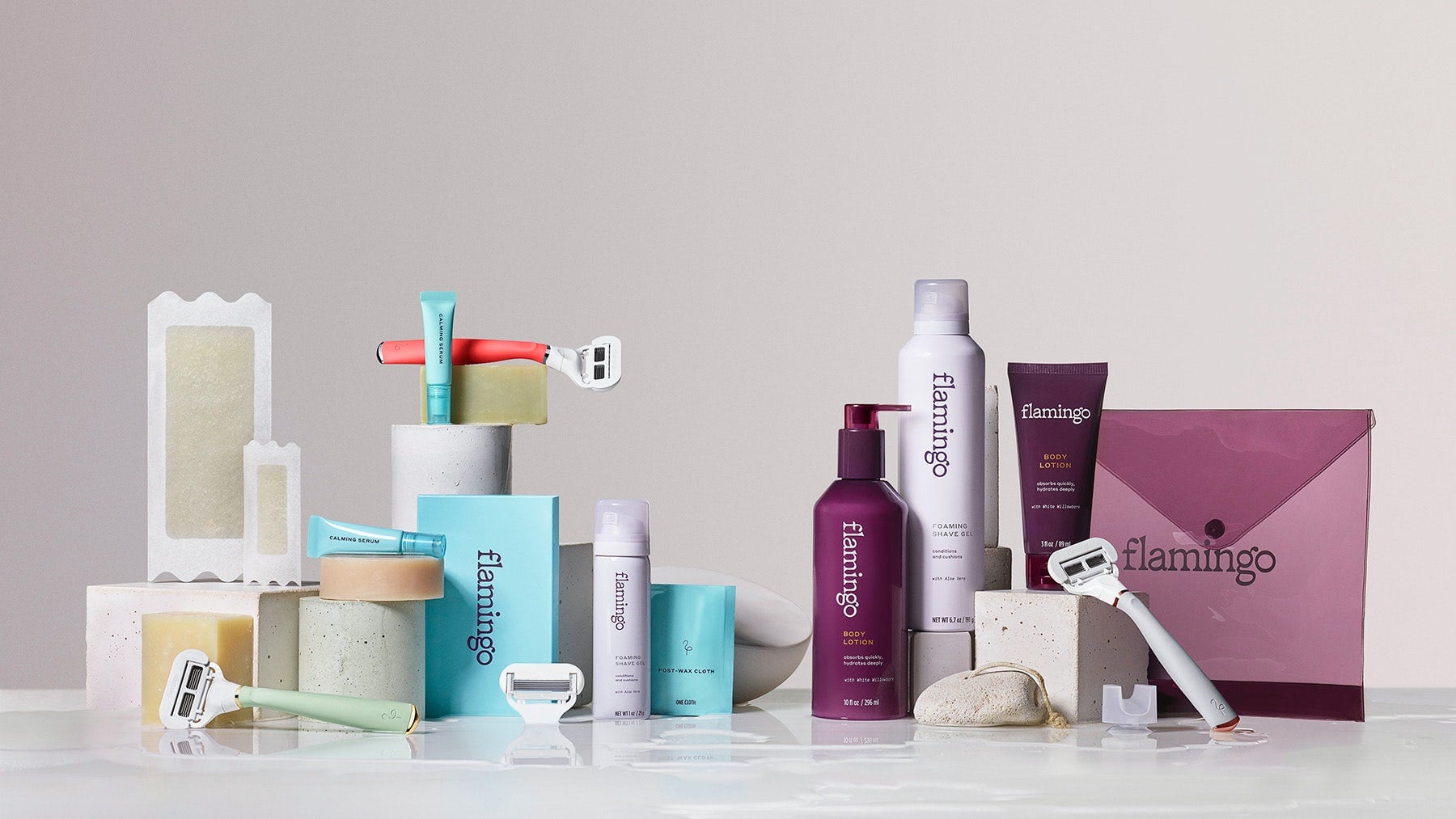
NEW YORK CITY, United States — Harry’s, which shook up the men’s razor market five years ago with its cheap blades shipped directly to homes, has its eye on a new market: women.
The startup launches Flamingo, a line of direct-to-consumer razors and waxing kits aimed at female customers, on Tuesday. Its pitch is simple: “Mustaches, we have them too.”
This and “We’re all hairy in places” are captions that could be found on Flamingo’s Instagram posts, reflecting the philosophy of Allie Melnick, general manager of the brand and a self-professed “very hairy woman.” She said she wants women to open up about a “complicated, quiet, almost taboo space,” speaking as she used a wax strip to strip a path of fuzz off her forearm.
Harry’s is one of several contenders trying to disrupt the $1 billion women’s razor market, which has resisted many of the changes that have swept men’s shaving since Dollar Shave Club and Harry’s launched in 2011 and 2013, respectively. Both companies offer subscription services that regularly ship disposable razors to customers’ homes, bypassing the drugstore and undercutting industry giants Gillette and Schick on price. Unilever acquired Dollar Shave Club for $1 billion in 2016.
The old model is still largely intact for women, though that may be about to change. Flamingo would be the latest entrant into this market, after Billie, a venture-backed startup that launched last November and Schick and Gillette, which introduced a subscription shave plan and a subscription service for its Venus razor in May of 2017 and August of this year, respectively.
Disrupting the women’s razor sector isn’t as sure a bet as it was for men.
Subscriptions were a fresh idea five years ago, but now consumers are bombarded with pitches to receive regular shipments of everything from toothbrushes to pet food. Schick and Procter & Gamble’s Gillette won’t be caught by surprise this time. Another question: Do women care if the razor they’re using is “for women?”
The strategy direct-to-consumer players are using to target women is different, too. Harry’s and Dollar Shave Club were all about simplicity and approachable pricing, and while Flamingo and Billie are cheaper than many competitors, the brands talk about society shaming hairy women, and the “pink tax” – the idea that women’s hygiene products are artificially marked up.
“I personally don’t have a preference over a ‘male’ razor or ‘female’ razor. As long as they get the job done, it’s a good razor,” said Isabella Lee, a 17-year-old video-game creator and student from Texas. “They’re each meant to fulfil the same task yet if it’s decorated in a pink floral pattern, it will cost a bit more. The colour doesn’t make the product any different or better at its job.”
Jeff Raider, co-founder of Harry’s, said Flamingo was designed as its own brand independent of Harry’s men’s products, with a dedicated team of 14, including Melnick, and Brittania Boey, senior vice president of research and development and design, who have both worked at Harry’s since inception.
Flamingo is the first label born out of Harry’s Labs, an innovation arm created earlier this year to build a portfolio of complimentary brands. Among the technologies introduced to the US by Flamingo were soft gel strips to wax shorter hairs than traditional wax – and doesn’t require heating up, Melnick said. The company can scale up quickly, as it operates its own factory in Germany and completed a $112 million funding round in February (the startup has raised a total of $375 million to build its grooming empire).
The women’s body care line, with an initial focus on hair removal, will sell a selection of razors – including handles in three colours, razors and blades – as well as wax kits, shaving gel and body lotion.
“When we started we thought about being a unisex brand, but when we got into it we realised men and women felt incredibly different about shaving and hair and they needed different products,” said Raider, who is also one of Warby Parker’s co-founders.
Where Billie offers a subscription service, Flamingo products are sold a la carte online. Both are cheaper than the top-selling Gillette models. Billie’s four-razor refill pack is priced at $9 and Flamingo charges $2 per cartridge, compared with $17 for four cartridges, or $4.25 each, that fit Gillette’s Venus Platinum handle.
“Personally, I was shaving with men’s razors before because I was just very aware of the pink tax. I was like, ‘I’m not giving these companies more of my money,’” Billie co-founder Georgina Gooley said. “When we were looking at pricing these products it was clear that we had to make the back-end economics work. The pink tax is completely ridiculous and it occurs across multiple categories – razors being one of the worst offenders.”
Absent from the push into women’s razors is the company that kicked off the direct-to-consumer razor craze, Dollar Shave Club. Kirsten Green, founder and managing partner of Forerunner Ventures, which also invested in the razor startup, said it made more sense for the company to focus on growing untapped elements of the men’s market.
“They service the customer they know how to connect with and there’s a big enough business there so far,” Green said. “Take the population of the US and divided it in half – and 80 percent of those men might connect with Dollar Shave Club. Why not keep leveraging that?”
Men’s razors accounted for approximately 58 percent of a $2.4 billion razor market in 2017, according to IbisWorld. Men shave at a higher frequency is one reason men’s product commands almost 40 percent more market share than women’s, but it’s also due to the leading men’s razors being premium, non-disposable options that are priced higher than their disposable counterparts.
Others worry about subscription fatigue, particularly in a category that many women view as a luxury. Where men view a high-quality razor as a must-have, it’s more “nice to have” for women,” said Clara Sieg, a partner at venture firm Revolution Ventures.
“From a consumer perspective – how many subscriptions are you comfortable taking on and managing? Do I want a separate subscription service for my shampoo, for my razor, for my toothbrush? For me the answer is no,” she added.
The new crop of women’s razor companies say beyond the pink tax, they see an opportunity to reimagine decades of messaging that’s equated female beauty with hairlessness.
“We try to relate to women’s realities, and women’s realities are not that they’re perfect goddesses who are cleanly shaven – and not that they never remove any of their hair. For most women it’s somewhere in between,” Raider said.
Gillette’s high gloss ads featuring miles long, hairless limbs, is evolving its messaging too. Last week, the razor behemoth launched a “My Skin. My Way” campaign for its Gillette Venus razors to celebrate “every woman and her skin” with a female led team – in front of and behind the camera – to create imagery that contains no retouching.
Since the campaign went live on Gillette Venus’ YouTube Channel, the video has garnered just over 1,400 views – paling in comparison to “real women” campaigns by Dove or more recently, Glossier.
Related Articles:
[ Is Luxury Haircare Ripe for Disruption?Opens in new window ]
[ Inside Glossier’s Plans to Shake the Beauty IndustryOpens in new window ]



